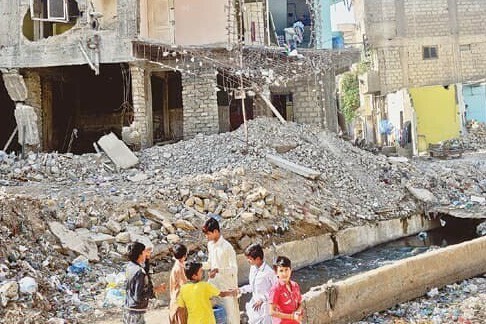
Millions of poor who eke out meagre daily earnings on footpaths and street corners in Pakistan are punished, abused, assaulted and sent to prison, all because the ruling elite want the roads cleared for their SUVs, pavements for their dogs to walk and their neighbourhood to resemble Dubai avenues.
The ruling elite of Pakistan thinks of nothing when investing billions in hi-rise mansions in London, Switzerland and Dubai. The poor live without adequate wheat flour, in shanty houses hiding behind Defence Housing Authority gated communities across the country. A recent report by the Human Rights Watch, titled ‘Abusive Forced Evictions in Pakistan’, highlighted how the poor were forcibly removed from urban spaces. The report said it was a “frequent and widespread” problem in Pakistan.
Big-time real estate companies, mostly run by the Pakistan Army and other wings of the armed forces, clear out the poor from their tightly lived-in spaces for mega projects for the rich. The poor have no voice–the media, the judiciary and civil rights groups are often hand in glove with the real estate sharks and their corrupt accomplices in police, bureaucracy and politics.
The state is the biggest, and the cruellest, of the evictors. Armed with legal weapons, the state push the poor out of their homes and working areas without a thought for their welfare and safety. Children lose not only homes but also schools and friends when their families are forced out by bulldozers accompanied by baton-wielding police. The poor lose their carts and shops likewise. Some may save their belongings by paying heavy bribes to municipal and police authorities but all of them lose their place of work to the state. According to an article in the English newspaper, Dawn, in Islamabad, Farmanullah, a sole breadwinner for a large family, had to pay a hefty fine and suffer prison for three months for selling kulfi outside the Faisal Mosque.
The newspaper also recorded the tragic story of shanty town residents in Karachi’s Gujjar Nullah. In November 2021, the Karachi municipal authorities demolished the house of one Zakia Bibi. Her husband died on seeing his house turning to rubble. He had spent his life’s earnings to build a small house for his family. Zakia and others lamented that the state was signing their death warrants with every demolition. Zakia died of a heart attack four days after her house was demolished.
Children suffer the most. They lose schools and rarely ever get another chance to resume education. During the construction of Lahore’s Orange Line Metro Train, at least 42 educational institutions were partially or completely demolished. The Karachi-based Urban Resource Centre, in a study, found that an anti-encroachment campaign after the 2020 monsoon rains had disrupted the education of over 30,000 students.
The Human Rights Watch report documented that Karachi had witnessed several anti-encroachment drives in recent years. In 2018, more than 1000 shops were demolished in the Empress Market. In 2020, evictions and demolition in Orangi and Gujjar Nullahs saw the demolition of over 12,000 homes where close to 96,000 people lived. Human rights activists have often documented the use of threats, intimidation and unnecessary or excessive force by the state agencies to push out the poor from their homes. There have been frequent clashes between armed policemen and unarmed locals on such occasions. Such anti-encroachment drives, to carve out high-heeled enclaves and land grabs by the rich have become a regular occurrence to clear the poor for the rich and influential in Pakistan.






